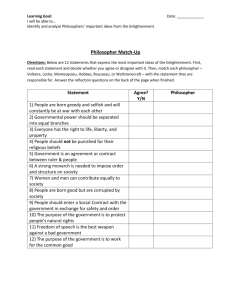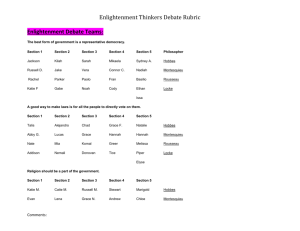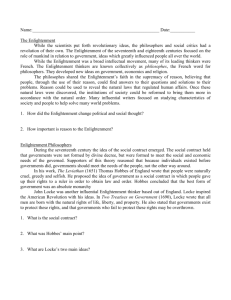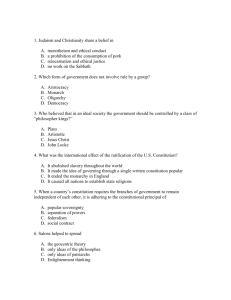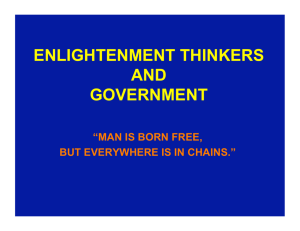The Philosophers of the Enlightenment
advertisement
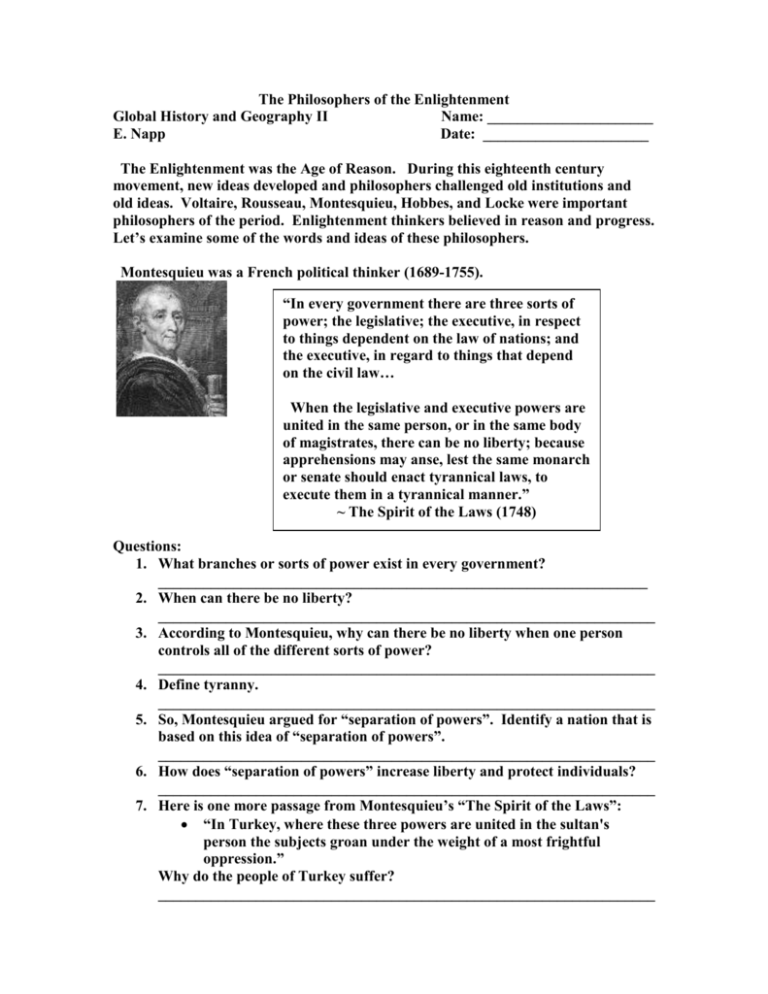
The Philosophers of the Enlightenment Global History and Geography II Name: ______________________ E. Napp Date: ______________________ The Enlightenment was the Age of Reason. During this eighteenth century movement, new ideas developed and philosophers challenged old institutions and old ideas. Voltaire, Rousseau, Montesquieu, Hobbes, and Locke were important philosophers of the period. Enlightenment thinkers believed in reason and progress. Let’s examine some of the words and ideas of these philosophers. Montesquieu was a French political thinker (1689-1755). “In every government there are three sorts of power; the legislative; the executive, in respect to things dependent on the law of nations; and the executive, in regard to things that depend on the civil law… When the legislative and executive powers are united in the same person, or in the same body of magistrates, there can be no liberty; because apprehensions may anse, lest the same monarch or senate should enact tyrannical laws, to execute them in a tyrannical manner.” ~ The Spirit of the Laws (1748) Questions: 1. What branches or sorts of power exist in every government? _________________________________________________________________ 2. When can there be no liberty? __________________________________________________________________ 3. According to Montesquieu, why can there be no liberty when one person controls all of the different sorts of power? __________________________________________________________________ 4. Define tyranny. __________________________________________________________________ 5. So, Montesquieu argued for “separation of powers”. Identify a nation that is based on this idea of “separation of powers”. __________________________________________________________________ 6. How does “separation of powers” increase liberty and protect individuals? __________________________________________________________________ 7. Here is one more passage from Montesquieu’s “The Spirit of the Laws”: “In Turkey, where these three powers are united in the sultan's person the subjects groan under the weight of a most frightful oppression.” Why do the people of Turkey suffer? __________________________________________________________________ Rousseau was a French philosopher of the Enlightenment (1712-1778). "The problem is to find a form of association which will defend and protect with the whole common force the person and goods of each associate, and in which each, while uniting himself with all, may still obey himself alone, and remain as free as before." This is the fundamental problem of which the Social Contract provides the solution. ~ The Social Contract (1762) Questions: 1. What problem arises as individuals form an association to defend and protect each other? What might they give up as a result of this association? ____________________________________________________________ 2. What must an individual still be able to do after forming an association with other members of society? ____________________________________________________________ 3. So, a “Social Contract” is an agreement between the various members of a society and its government. The Social Contract is necessary because one man cannot protect himself against all threats. But in joining together, the individual cannot lose his individual liberty. Therefore, Rousseau argued that the government must express the will of the people and not its own will. What do you think Rousseau believed the people should do if the government did not express the will of its people? ____________________________________________________________ Voltaire was a French philosopher of the Enlightenment (1694-1778). “It is the same with excommunications. Our historians tells us that when King Robert was excommunicated by Pope Gregory V, for marrying his godmother, the princess Bertha, his domestic servants threw the meats to be served to the king right out the window, and Queen Bertha gave birth to a goose in punishment for the incestuous marriage. One could seriously doubt that in this day and age the servants of the king of France, if he were excommunicated, would throw his dinner out the window, or that the queen would give birth to a goose.” ~ A Treatise on Toleration (1763) Questions: 1. What “punishments” besides excommunication happened to King Robert for marrying his godmother? ______________________________________________________ 2. Voltaire despised or hated superstitions. What is a superstition? ______________________________________________________ 3. Are superstitions based on reason? ______________________________________________________ 4. So, why did Voltaire despise superstitions? ______________________________________________________ Thomas Hobbes was a British political thinker (1588-1679). “So that in the nature of man, we find three principal causes of quarrel. First, competition; secondly, diffidence (lacking confidence); thirdly, glory. “The first maketh men invade for gain; the second, for safety; and the third, for reputation. The first use violence, to make themselves masters of other men's persons, wives, children, and cattle; the second, to defend them; the third, for trifles, as a word, a smile, a different opinion, and any other sign of undervalue, either direct in their persons or by reflection in their kindred, their friends, their nation, their profession, or their name. Hereby it is manifest that during the time men live without a common power to keep them all in awe, they are in that condition which is called war; and such a war as is of every man against every man.” ~ Leviathan (1651) Questions: 1. Why do men quarrel or fight? ____________________________________________________________ 2. Why do men use violence? ____________________________________________________________ 3. Why is a common power necessary? ____________________________________________________________ 4. Thomas Hobbes supported the idea of absolutism or a monarch must have absolute power. How does this passage support absolute monarchs? ____________________________________________________________ 5. How do Thomas Hobbes’ views on government differ from Montesquieu’s views on government? ____________________________________________________________ 6. How do Thomas Hobbes’ views on government differ from Rousseau’s views on government? ____________________________________________________________ John Locke was a British political thinker (1632-1704). “And that all men may be restrained from invading others rights, and from doing hurt to one another, and the law of nature be observed, which willeth the peace and preservation of all mankind, the execution of the law of nature is, in that state, put into every man's hands, whereby every one has a right to punish the transgressors of that law to such a degree, as may hinder its violation: for the law of nature would, as all other laws that concern men in this world 'be in vain, if there were no body that in the state of nature had a power to execute that law, and thereby preserve the innocent and restrain offenders…” ~ Two Treatises of Government (1690) Questions: 1. According to Locke, what actions must men be refrained from? __________________________________________________________ 2. Why must men be refrained from such actions? ___________________________________________________________ 3. What do men who have been harmed have a right to do? ___________________________________________________________ 4. Locke believed that governments only exist to protect men’s natural rights, the right to life, liberty, and property. How does this passage support his belief? ___________________________________________________________ Now, I will provide a quote and you will identify the Enlightenment thinker who spoke the words: “When the legislative and executive powers are united in the same person, or in the same body of magistrates, there can be no liberty; because apprehensions may arise, lest the same monarch or senate should enact tyrannical laws, to execute them in a tyrannical manner.” Identify the Enlightenment philosopher: ___________________________________________________________ “Government has no other end, but the preservation of property.” Identify the Enlightenment philosopher: ____________________________________________________________ “To this war of every man against every man, this also in consequent; that nothing can be unjust. The notions of right and wrong, justice and injustice have there no place. Where there is no common power, there is no law, where no law, no injustice. Force, and fraud, are in war the cardinal virtues.” Identify the Enlightenment philosopher: ____________________________________________________________ “Man is born free; and everywhere he is in chains.” Identify the Enlightenment philosopher: ____________________________________________________________ “As long as people believe in absurdities (inconsistent with reason) they will continue to commit atrocities (cruel acts).” Identify the Enlightenment philosopher: ____________________________________________________________ Speaker A: The story of history is the story of class struggles. Revolution is necessary to overthrow the ruling class and eventually create a classless society in which no one will be exploited. Speaker B: The royal power is absolute and the prince need render account of his acts to no one. Where the word of a king is, there is no power. Without this absolute authority, the king could neither do good nor repress evil. Speaker C: Government should leave business alone. It should let the natural law of supply and demand determine what gets produced, how much gets produced, who does the work, the price of goods, rates of pay, and all other economic questions. Speaker D: Men are born and remain free and equal in rights. It is the duty of every government to preserve and protect these natural inalienable rights. Which speaker expresses the views of John Locke and Jean Jacques Rousseau? 1. 2. 3. 4. A B C D Writers of the Enlightenment were primarily interested in 1. 2. 3. 4. changing the relationship between people and their government supporting the divine right theory debating the role of the church in society promoting increased power for European monarchs
